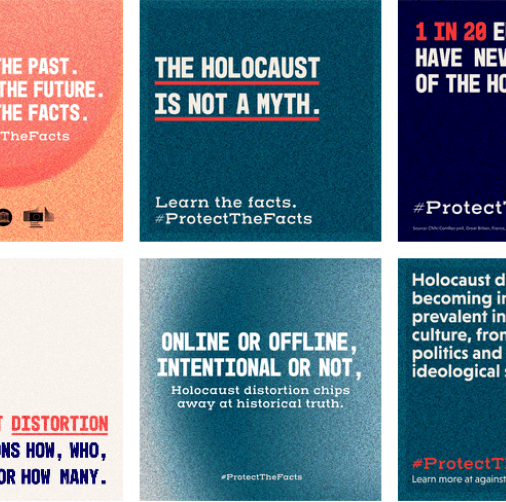Language:
English

Working definition of Holocaust denial and distortion
Read the full text of the IHRA’s non-legally binding working definition of Holocaust denial and distortion and learn more about this important tool with the FAQs below.
Our working definitions are available in multiple languages. While we try to ensure the accuracy of all of our translations, in the event of any discrepancies, the English translation takes precedence.
The working definition of Holocaust denial and distortion: full text
The present definition is an expression of the awareness that Holocaust denial and distortion have to be challenged and denounced nationally and internationally and need examination at a global level. IHRA hereby adopts the following legally non-binding working definition as its working tool.
Holocaust denial is discourse and propaganda that deny the historical reality and the extent of the extermination of the Jews by the Nazis and their accomplices during World War II, known as the Holocaust or the Shoah. Holocaust denial refers specifically to any attempt to claim that the Holocaust/Shoah did not take place.
Holocaust denial may include publicly denying or calling into doubt the use of principal mechanisms of destruction (such as gas chambers, mass shooting, starvation and torture) or the intentionality of the genocide of the Jewish people.
Holocaust denial in its various forms is an expression of antisemitism. The attempt to deny the genocide of the Jews is an effort to exonerate National Socialism and antisemitism from guilt or responsibility in the genocide of the Jewish people. Forms of Holocaust denial also include blaming the Jews for either exaggerating or creating the Shoah for political or financial gain as if the Shoah itself was the result of a conspiracy plotted by the Jews. In this, the goal is to make the Jews culpable and antisemitism once again legitimate.
The goals of Holocaust denial often are the rehabilitation of an explicit antisemitism and the promotion of political ideologies and conditions suitable for the advent of the very type of event it denies.
Distortion of the Holocaust refers, inter alia, to:
1. Intentional efforts to excuse or minimize the impact of the Holocaust or its principal elements, including collaborators and allies of Nazi Germany;
2. Gross minimization of the number of the victims of the Holocaust in contradiction to reliable sources;
3. Attempts to blame the Jews for causing their own genocide;
4. Statements that cast the Holocaust as a positive historical event. Those statements are not Holocaust denial but are closely connected to it as a radical form of antisemitism. They may suggest that the Holocaust did not go far enough in accomplishing its goal of “the Final Solution of the Jewish Question”;
5. Attempts to blur the responsibility for the establishment of concentration and death camps devised and operated by Nazi Germany by putting blame on other nations or ethnic groups.
Frequently asked questions
Why was the IHRA working definition of Holocaust denial and distortion developed?
In 2010, the IHRA started grappling seriously with how to address the viral spread of denial and distortion online, the use of trivialization to spread antisemitism, and the warping of history to excuse Nazi collaborators of their crimes. In developing responses to these problems, IHRA experts realized they needed a working definition to identify the problem and focus their efforts.
Who developed the IHRA working definition of Holocaust denial and distortion?
This working definition was developed by IHRA experts in the Committee on Antisemitism and Holocaust Denial in cooperation with the IHRA’s governmental representatives as a practical working tool. The IHRA’s Member Countries adopted the working definition of Holocaust denial and distortion by consensus at the IHRA’s Plenary meeting in Toronto on 10 October 2013. The Plenary is the IHRA’s decision-making body made up of representatives from all IHRA Member Countries.
What has its impact been?
The working definition of Holocaust denial and distortion has laid the foundation for further resources on recognizing and countering Holocaust denial and distortion.
It has also inspired action outside the IHRA. The United Nation’s General Assembly, for example, used the working definition in its Resolution A/76/L.30 (20 January 2022), which condemned denial and distortion of the Holocaust and commended the IHRA for its work.
Recent strategies to combat antisemitism, like that of the European Union, have also taken countering Holocaust denial and distortion into account, filling an important gap.
What can people do to counter Holocaust denial and distortion?
Holocaust denial and distortion are international problems that require an international response. While no one individual or organization can fight them alone, each of us has a role to play. Help raise awareness by joining our #ProtectTheFacts campaign on social media. Learn about denial and distortion with the IHRA’s publications and films. Encourage change by sharing the IHRA’s policy recommendations with leaders in your government and community.
Sign up to our newsletter to
receive the latest updates
By signing up to the IHRA newsletter, you agree to our Privacy Policy





